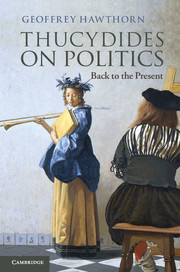Book contents
- Frontmatter
- Dedication
- Contents
- Preface and acknowledgements
- Chronology 545–323 BC
- List of maps
- Maps
- 1 The text
- 2 Writing power: Athens in Greece 478–435
- 3 Explaining the war: stated reasons 435–432
- 4 Explaining the war: true reasons 432
- 5 Judgements 431–430
- 6 Absent strategies 430–428
- 7 Speech and other events 428–427
- 8 Meaning and opportunity 426–424
- 9 Necessities 424
- 10 Interests 423–421
- 11 Emotion in deed 420–416
- 12 Purposes and decisions 415
- 13 Character and circumstance 414–413
- 14 One war 413–411
- 15 Back to the present
- Synopsis of the text by book and year
- Further reading
- References
- Index
5 - Judgements 431–430
Published online by Cambridge University Press: 05 June 2014
- Frontmatter
- Dedication
- Contents
- Preface and acknowledgements
- Chronology 545–323 BC
- List of maps
- Maps
- 1 The text
- 2 Writing power: Athens in Greece 478–435
- 3 Explaining the war: stated reasons 435–432
- 4 Explaining the war: true reasons 432
- 5 Judgements 431–430
- 6 Absent strategies 430–428
- 7 Speech and other events 428–427
- 8 Meaning and opportunity 426–424
- 9 Necessities 424
- 10 Interests 423–421
- 11 Emotion in deed 420–416
- 12 Purposes and decisions 415
- 13 Character and circumstance 414–413
- 14 One war 413–411
- 15 Back to the present
- Synopsis of the text by book and year
- Further reading
- References
- Index
Summary
‘Thucydides the censor’, said Nicole Loraux, ‘stamps his judgement with the seal of objectivity…in the austere guise of an impartial observer’; he writes sub specie aeternitatis. This cannot be right. The guise that she describes is one of our own. It was Shelley who imagined an ‘eye with which the universe beholds itself and knows itself divine’; Henry Sidgwick, excising the divine, who adopted the image; John Rawls, following Sidgwick, who reached for a view of the human condition that any rationally impartial person anywhere could be expected to take at any time this side of eternity. One can choose to imagine that Thucydides was attracted to one or another of the conceptions from which contemporaries might have conjured a distance between any particular observer and his world; to conceptions in Xenophanes or Heraclitus for instance of an omniscient god (though Thucydides gives every sign of being impatient with theologies and divination); or in Empedocles of an endless oscillation between agents of combination and separation; or in Democritos of agent-less atoms colliding, rebounding, linking and delinking; but there is no sign that he was so attracted, and imputing any such conception to him, though not difficult to do, is idle.
- Type
- Chapter
- Information
- Thucydides on PoliticsBack to the Present, pp. 51 - 67Publisher: Cambridge University PressPrint publication year: 2014

